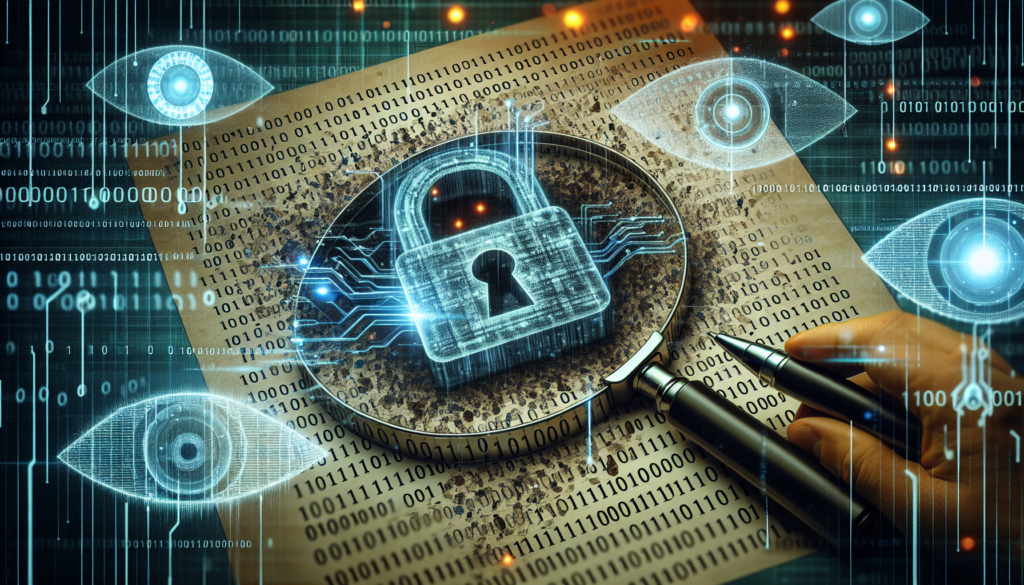In today’s hyper-connected world, the relationship between privacy and security has become increasingly intertwined. You value your privacy, but have you ever considered how it relates to your overall security? This article will shed light on the intricate connection between privacy and security, exploring how protecting your personal information is not only crucial for safeguarding your identity but also for maintaining a secure digital landscape. By understanding this connection, you can navigate the digital landscape with confidence and make informed decisions about your privacy and security.

Privacy and Security
Understanding the Relationship
In today’s digital age, privacy and security have become increasingly interconnected. While privacy refers to the right to keep personal information and activities hidden from others, security focuses on protecting individuals and their data from unauthorized access, threats, and harm. Although distinct concepts, privacy and security are closely intertwined, with each relying on the other to ensure individuals’ safety and well-being in both the physical and digital realms.
Interdependence of Privacy and Security
Privacy and security go hand in hand to create a foundation of trust and safety in various aspects of life. Without privacy, individuals may feel their personal information is at risk, leading to a lack of trust in the systems and institutions that handle their data. On the other hand, without adequate security measures in place, privacy cannot be effectively guaranteed. The interdependence of privacy and security highlights the need for a comprehensive approach that addresses both aspects to safeguard individuals’ rights and protect them from potential threats or harms.
Privacy
Defining Privacy
Privacy, at its core, refers to the autonomy individuals have over their personal information, activities, and spaces. It encompasses the ability to control what information is collected, how it is used, and with whom it is shared. Privacy allows individuals to maintain a sense of personal freedom and dignity without undue interference or scrutiny.
Importance of Privacy
Privacy holds significant importance in both personal and societal contexts. It fosters a sense of individuality, allowing people to freely express themselves, form opinions, and engage in activities without fear of judgment or reprisal. It also encourages trust between individuals and institutions, creating an environment where people feel comfortable sharing personal information without the fear of misuse or exploitation.
Relevance of Privacy in the Digital Age
With the increasing digitization of information and the growing reliance on technology, privacy has become a pressing concern. In the digital age, personal information is being collected, stored, and shared more than ever before. The rise of social media platforms, online shopping, and digital communications has made individuals more vulnerable to privacy invasions, highlighting the need for strong privacy protections in the face of evolving technological advancements.
Security
Defining Security
Security encompasses the measures taken to protect individuals, systems, and data from various threats, including unauthorized access, data breaches, and malicious attacks. It involves the implementation of safeguards, protocols, and technologies to mitigate risks and ensure the confidentiality, integrity, and availability of information. Security measures are designed to anticipate and prevent potential threats while offering a sense of trust and assurance to individuals and organizations.
Importance of Security
Security is paramount in maintaining the integrity of systems, protecting sensitive information, and safeguarding individuals from harm. It plays a crucial role in preventing unauthorized access, identity theft, financial fraud, and other malicious activities that can compromise both personal and organizational privacy. Strong security measures not only instill confidence but also deter potential attackers, reducing the likelihood of data breaches or cybercrimes.
Different Aspects of Security
Security encompasses various aspects, including physical security, network security, information security, and cybersecurity. Physical security involves securing physical assets, such as buildings, equipment, and data centers, to prevent unauthorized access. Network security focuses on protecting computer networks and systems from external threats and unauthorized intrusions. Information security involves measures to safeguard the confidentiality, integrity, and availability of information. Cybersecurity specifically addresses the protection of digital assets and systems against cyber threats, including malware, hacking, and phishing attempts.
The Core Connection
Privacy as a Fundamental Right
Privacy is considered a fundamental human right, recognized by international declarations and legal frameworks. It is enshrined in the Universal Declaration of Human Rights, emphasizing the importance of protecting individuals’ privacy as an inherent aspect of their dignity and autonomy. Privacy enables individuals to exercise their rights to freedom of thought, expression, and association without undue interference or monitoring.
Security Measures to Protect Privacy
Security measures act as a shield to protect privacy. By implementing robust security protocols, organizations and individuals can reduce the risk of unauthorized access or breaches that can compromise the confidentiality of personal information. Measures such as encryption, firewalls, authentication mechanisms, and strict access controls contribute to safeguarding sensitive data and ensuring privacy remains intact.
Privacy and Security as Counterparts
Privacy and security are often viewed as two sides of the same coin. While privacy ensures the preservation of personal autonomy and individual rights, security acts as the safeguard that ensures those rights are protected. Without security, privacy is vulnerable to breaches and compromise. Similarly, without privacy, security measures lack the personal context necessary for effective protection. Privacy and security, therefore, complement and reinforce each other in maintaining a safe and trusted environment.

Threats to Privacy and Security
Identity Theft
Identity theft is an increasingly prevalent threat in today’s digital landscape. It involves the unauthorized use of someone’s personal information, such as their name, social security number, or financial details, for fraudulent purposes. Cybercriminals exploit vulnerabilities in security systems or prey on individuals’ unawareness to gain access to sensitive data, leading to financial loss, reputational harm, and emotional distress.
Data Breaches
Data breaches occur when unauthorized individuals gain access to sensitive information stored in databases or servers. These breaches can occur due to system vulnerabilities, insider threats, or targeted attacks. The consequences of data breaches can be severe, including the exposure of personal information, financial loss, compromised privacy, and even identity theft.
Surveillance
Surveillance poses a threat to both privacy and security. It involves the monitoring or tracking of individuals’ activities, either by governments, corporations, or malicious actors. Surveillance technologies, such as closed-circuit cameras, facial recognition systems, and online tracking tools, can infringe upon individuals’ privacy rights and potentially lead to abuses of power and violations of human rights.
Malware and Hacking
Malware and hacking pose significant risks to privacy and security. Malware refers to malicious software designed to infiltrate systems and networks, often with the intent to steal personal information, disrupt operations, or gain unauthorized access. Hacking involves unauthorized intrusion into computer systems or networks, typically to exploit vulnerabilities and gain access to sensitive data.
Role of Privacy in Maintaining Security
Privacy as a Fundamental Element
Privacy serves as a foundational element in maintaining security. By ensuring individuals have control over their personal information and are empowered to make choices about its disclosure, privacy allows for the establishment of secure systems that respect and protect personal autonomy. When privacy is prioritized, individuals are more willing to engage with systems, share necessary information, and cooperate in security measures.
Protecting Sensitive Information
Privacy plays a critical role in protecting sensitive information from falling into the wrong hands. By establishing privacy safeguards, individuals can prevent unauthorized access to personal data, reducing the risk of identity theft, fraudulent activities, and other privacy breaches. Privacy measures such as limiting data collection, obtaining informed consent, and enforcing strict access controls contribute to protecting individuals’ sensitive information and maintaining their security.
Maintaining Confidentiality
Privacy ensures the confidentiality of personal information, fostering an environment of trust between individuals and organizations. When individuals have confidence that their data will be kept confidential and used only for the intended purpose, they are more likely to engage in secure interactions while sharing necessary information. Maintaining strict confidentiality helps prevent unauthorized disclosure, reducing the risk of potential harm or misuse of personal data.
Role of Security in Safeguarding Privacy
Implementing Security Measures
Security measures form the backbone of safeguarding privacy. Technologies such as encryption, secure networks, and robust access controls establish the necessary safeguards to protect personal information from unauthorized access, loss, or manipulation. By implementing proactive security measures, organizations and individuals can mitigate risks and ensure the integrity of personal data.
Preventing Unauthorized Access
Security measures focus on preventing unauthorized access to sensitive information, ensuring that only authorized individuals or entities can obtain access. Strong authentication mechanisms, intrusion detection systems, and secure communication protocols contribute to preventing unauthorized parties from gaining entry into systems and compromising privacy. By effectively preventing unauthorized access, security measures uphold individuals’ privacy rights and minimize potential privacy breaches.
Ensuring Data Integrity
Security measures play a vital role in maintaining data integrity, ensuring that information remains accurate, complete, and unaltered throughout its lifecycle. By implementing measures such as data backup, data encryption, and secure transmission protocols, individuals and organizations can protect against data tampering or manipulation. Data integrity measures are essential to maintaining privacy, as any unauthorized modification or corruption can compromise the accuracy and reliability of personal information.
Legal and Ethical Considerations
Privacy Laws and Regulations
Privacy laws and regulations provide the legal framework for protecting individuals’ privacy rights and ensuring the responsible handling of personal information. These laws outline the obligations of organizations in terms of data collection, usage, storage, and disclosure. Privacy laws vary across jurisdictions, but they generally emphasize the importance of individuals’ informed consent, data minimization, transparency, and accountability in maintaining privacy.
Ethical Implications of Privacy and Security
Privacy and security carry significant ethical implications, necessitating the responsible and ethical handling of personal information. Organizations and individuals must consider ethical principles such as respect for autonomy, privacy, and fairness when designing systems, implementing security measures, and handling personal data. Ethical considerations guide decision-making processes, ensuring that privacy and security are upheld in a manner that respects individuals’ rights and values.
Balancing Privacy and Security
Balancing privacy and security is a complex task, requiring careful consideration of individual rights and the collective need for safety and protection. Striking the right balance involves finding practical solutions that prioritize both privacy and security without unduly sacrificing one for the other. This requires comprehensive risk assessments, ethical evaluation, and continuous monitoring and improvement of privacy and security practices to address evolving threats and technological advancements.
Challenges and Controversies
Encryption Backdoors
The use of encryption plays a crucial role in protecting privacy and securing data. However, the request for encryption backdoors has been a subject of controversy. Some argue that creating backdoors for law enforcement purposes could compromise the overall security and privacy of individuals, as the presence of a backdoor increases vulnerability to malicious attacks. Striking the right balance between encryption and law enforcement access remains a challenge in ensuring privacy and security.
Mass Surveillance
Mass surveillance programs implemented by governments and corporations have raised concerns regarding privacy and security. The bulk collection of personal data without specific justifications or individualized suspicion can intrude upon privacy rights and potentially lead to abuses of power. Balancing the need for national security with the protection of individual privacy in the context of mass surveillance remains a topic of contention and ongoing debate.
Trade-Offs Between Privacy and Security
Navigating the trade-offs between privacy and security poses a challenge in finding the right equilibrium. While security measures can enhance protection, they often require the collection and processing of personal information, potentially encroaching upon privacy. Striking the right balance involves carefully evaluating the necessity, proportionality, and legitimacy of security measures to ensure they respect privacy rights without compromising overall security objectives.
Striking the Balance
Importance of Finding a Balance
Striking a balance between privacy and security is essential to ensure the preservation of individual rights while maintaining a secure environment. This balance allows for the protection of personal information and the prevention of harm, while simultaneously respecting personal autonomy and upholding privacy rights. By finding the right equilibrium, individuals’ privacy can be safeguarded without compromising essential security measures.
Privacy by Design
Privacy by Design is a framework that promotes privacy considerations throughout the entire lifecycle of systems and services. It involves proactively embedding privacy measures into the design and architecture of systems, ensuring privacy is prioritized from the outset rather than as an afterthought. Privacy by Design encourages organizations to adopt privacy-conscious practices, implement robust security measures, and provide individuals with greater control and transparency over their personal information.
User Education and Awareness
User education and awareness play a critical role in maintaining the balance between privacy and security. By educating individuals about potential risks, best practices, and privacy-enhancing technologies, they can make informed decisions and actively engage in protecting their privacy. Through user education and awareness initiatives, individuals can develop a greater understanding of the importance of privacy and security, empowering them to take proactive steps to safeguard their personal information.
In conclusion, privacy and security are intricately interconnected, relying on each other to create a safe and trusted environment. Privacy serves as a fundamental right, allowing individuals to maintain autonomy and control over their personal information. Security measures act as safeguards, protecting privacy by preventing unauthorized access, ensuring data integrity, and maintaining confidentiality. Striking the right balance between privacy and security requires ongoing efforts, considering legal, ethical, and societal considerations. By prioritizing both privacy and security, individuals and organizations can navigate the challenges of the digital age while ensuring the protection of personal information and upholding fundamental rights.
